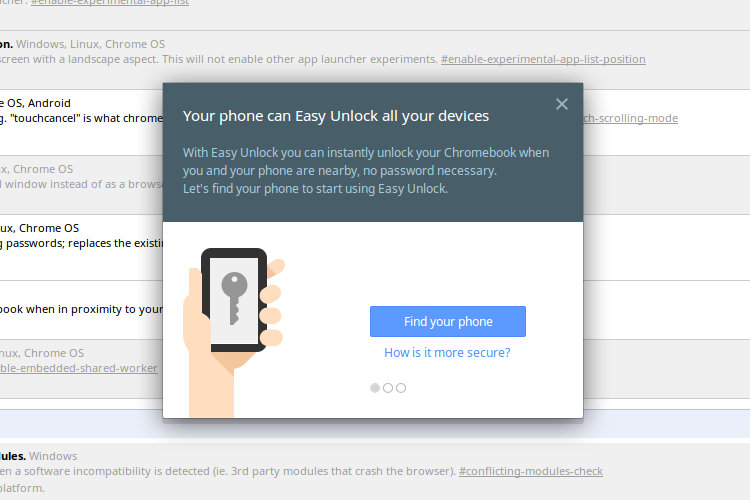
For a while, Google has been talking about killing the password with help from some physical object, whether it’s a phone, a ring, a tattoo or even a pill that you swallow.
The latest developer version of Chrome OS suggests that Google is putting those plans in motion.
Android Police has discovered a hidden setting, called “Easy Unlock,” that claims to let users sign into their Chromebooks without a password. As long as users have their phones nearby — and presumably paired via Bluetooth — they’d be able to skip the usual login screen.
Unfortunately, the feature isn’t actually working right now. Enabling it in the chrome://flags menu causes a notification to appear, and you can click on that notification for a basic explanation of what Easy Unlock does, but that’s as far as you can go. On my Chromebook, clicking the “Find your phone” button only caused the browser to crash and restart.
We’ve seen some similar approaches to device-based sign-ins before. Motorola’s Moto X, for instance, allows you to skip the PIN lock screen when the phone is connected to a Bluetooth device of your choosing. (When I reviewed the Moto X, I loved using this feature in conjunction with my Pebble smartwatch.)
But if Google adds device-based authentication for Chromebooks, it’d be the first time that such a feature was baked directly into a major computing platform. Neither Apple nor Microsoft have built anything similar into their operating systems, though Apple’s iPhone 5s does have a fingerprint sensor for unlocking the phone without a PIN.
Easy Unlock wouldn’t kill the password entirely, but it could encourage users to set stronger, more complex passwords that wouldn’t need to be entered as often.
There are also a lot of other directions that device-based logins could go. Instead of replacing the password, a paired phone could be the second step in two-factor authentication, eliminating the usual hassle of entering a code sent to the phone via text message. The paired device could also become a way to automatically sign into websites that are tied to your Google login.
Beyond the smartphone, it’s not hard to imagine Google adding other Easy Unlock devices, starting with Android Wear smartwatches, and maybe some day moving on to those crazy tattoos and authentication pills. The early work spotted in Chrome OS brings us a small step closer.
More Must-Reads from TIME
- Where Trump 2.0 Will Differ From 1.0
- How Elon Musk Became a Kingmaker
- The Power—And Limits—of Peer Support
- The 100 Must-Read Books of 2024
- Column: If Optimism Feels Ridiculous Now, Try Hope
- The Future of Climate Action Is Trade Policy
- FX’s Say Nothing Is the Must-Watch Political Thriller of 2024
- Merle Bombardieri Is Helping People Make the Baby Decision
Contact us at letters@time.com